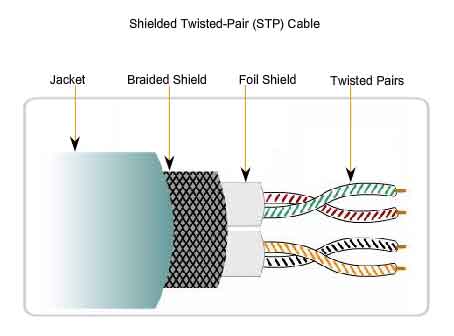
Quotes From Facebook That Is Meaningful to Me
Life is Short. Smile While You Still Have Teeth.
Hi, this is the fifth blog I did. This time I am going to do my blog in a more relaxing way...so as not to be so stressful :) Today, we learn on Cabling (LAN Technology). Okay, let me explain on the big picture on 'Cabling'.
What is Cabling?
- Is a medium through which information moves from one network device to another.
- In some cases, a network will utilise only 1 type of cable, other networks will use several types
How Many Types of LAN Technology Cabling?
- 4 Types :
Unshielded Twisted Pair (UTP), Shielded Twisted Pair (STP), Coaxial Cable, Fiber Optic Cable
UTP
- Have 4 pairs of wires inside the jacket.
- Each pair is twisted with a different number of twists per inch =) help to eliminate interference from adjacent pairs and other electrical devices.
- Disadvantage =) susceptible to radio and electrical frequency interference.
There are 5 types of categories and uses for UTP
Category 1 - Voice (Wayer Telefon)
Category 2 - Data to 4 Mbps (LocalTalk)
Category 3 - Data to 10 Mbps (Ethernet)
Category 4 - Data to 20 Mbps (18 Mbps Token Ring)
Catogory 5 - Data to 100 Mbps ( Fast Ethernet)
The standard connector for UTP is Register Jack-45 connector.
STP
- has 2 individual wires wrapped in a foil shielding to help provide a more reliable data communication.
- suitable for environment with electrical interference bur the extra shielding makes the cables quite bulky.
- used on networks using Token Ring topology.

Co-axial Cable
- Coaxial cabling has a single copper conductor at its centre.
- A plastic layer provides insulation between the center conductor and a braided metal shield.
- Metal shield helps to block any outside interference from fluoroscent lights, motors and other computers.
- The most common type of connector used with coaxial cable is the Bayonet-Neill-Concelman (BNC) connector.
- Different types of adapters are available for BNC connectors, including a T-connector, barrel connector and terminator.

Fibre Optics
- centre glass core surrounded by several layers of protective materials.
- transmits light rather than electronic signals, solving the problem of electrical interference.
- ideal for places where has large amount of electrical interference.
- Able to transmit signals over longer distance than coaxial and twisted pair.
Summary of Ethernet Cabling
Specification Cable Type Maximum Length
10BaseT UTP 100 meters
10Base2 Thin Coastal 185 meters
10Base5 Thick Coastal 500 meters
10BaseF Fiber Optic 2000 meters
Cable and Topology
Physical Topology General Cabel General Protocol
Linear Bus Coaxial Cable Ethernet
Twisted Pair LocalTalk
Fiber Optic
Star Twisted Pair Ethernet
Fiber Optic LocalTalk
Star - Wired Ring Twisted Pair Token Ring
Tree Coaxial Cable
Twisted Pair Ethernet
Fiber Optic
Apat from this, today I gain extra knowledge on how to create a blog and I can use to apply in my blog such as how to insert music, the layout, template, design and etc, Besides, I learn more on the search engine. Some other search engine apart from Goggle, Yahoo, like Dogpile, Ask, Boolean searching (have words like AND, NOT, OR) are very useful when searching the information.
That's all from me..Thanks for reading.

No comments:
Post a Comment